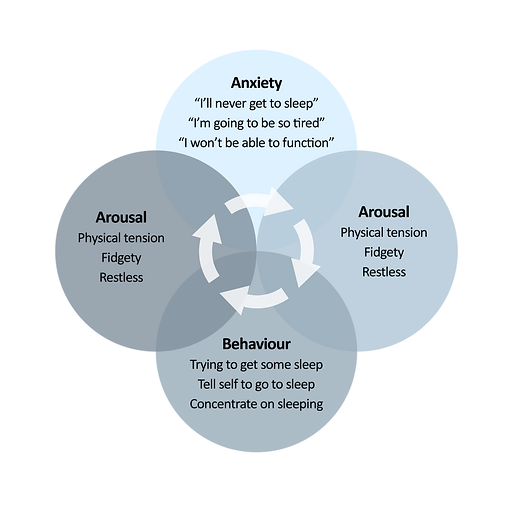
Help with insomnia and sleep problems
Insomnia, sleep anxiety and other sleep problems are common and do affect a large number of people. One evidence-based approach to dealing with bad sleep or insomnia is a specialist type of Cognitive Behavioural Therapy (CBT) known as CBT-I (CBT for Insomnia).
We can look at sleep problems in the context of the three Ps:
Predisposing factors – e.g. family history of poor sleep, always having been a bad sleeper.
Precipitating factors – the triggers for our current sleep problems e.g. a promotion at work, a house move, getting fired, etc.
Perpetuating factors – the things that keep our current problems with sleep going.
The basis of CBT is that there is a relationship between how we think and behave, and our chances of sleeping successfully. We often find it easier to understand poor sleep when there is an obvious precipitating factor – it makes sense to us not to sleep well if there’s a lot of stress going on at work. Once that stress goes away, sleep does improve.
However, persistent sleep problems are different to this. In long-term poor sleep, difficulty sleeping becomes the focus of worry, rather than a work/relationship/other issue. We start to worry about our problems with sleep, and the consequences of poor sleep. This might mean you find yourself experiencing:
-
Negative thoughts about being able to sleep, and then during the time you are trying to sleep
-
Negative emotions before bed time and during bed time.
-
For example, thinking “if I don't get to sleep soon, I am never going to be able to cope tomorrow” can become associated with anxiety and frustration,
-
This can lead to the person tossing and turning in bed, and being even less able to sleep. We find ourselves caught in a vicious cycle that not only keeps our sleep problems going, but also makes them worse.
CBT is designed to break these vicious cycles and to address the unhelpful patterns we might be stuck in.

How many sessions will I need?
The first step is to have a detailed sleep assessment to understand the nature of the problem and to see if sleep therapy would be suitable. If we identify that therapy can help, a typical CBT-I program runs for up to 8 weeks, with weekly or fortnightly sessions lasting 60 minutes.
What will treatment involve?
Treatment plans can vary according to your needs but typically in CBT-I, we will explore:
-
Psycho-education about sleep and insomnia
-
Sleep hygiene
-
Sleep restriction therapy, based on a sleep diary
-
Stimulus control (building a strong association between the bed and sleep)
-
Goal setting and behaviour change
-
Identifying unhelpful thinking and thought challenging
-
Relaxation techniques
-
Relapse prevention and maintaining healthy sleep habits